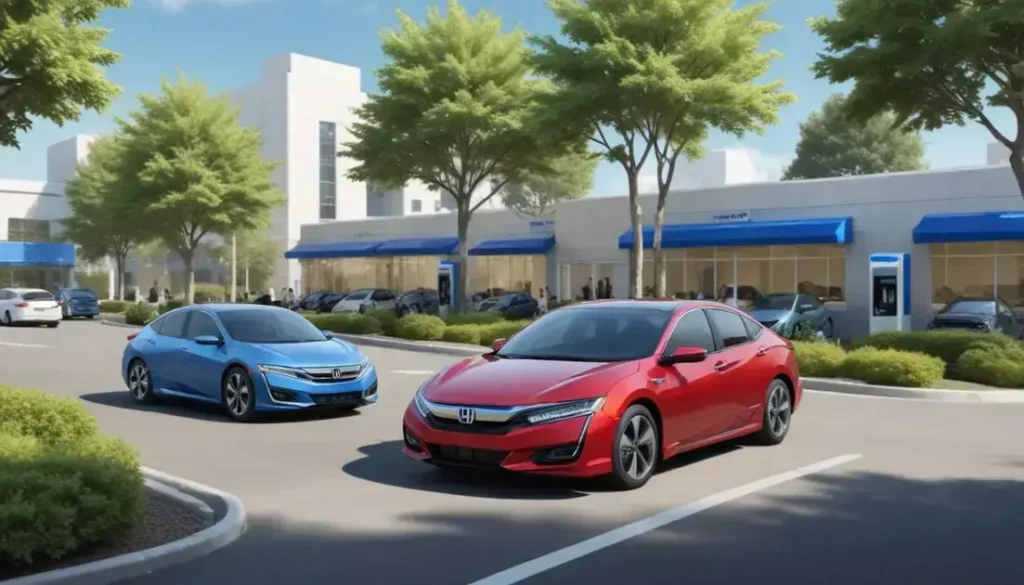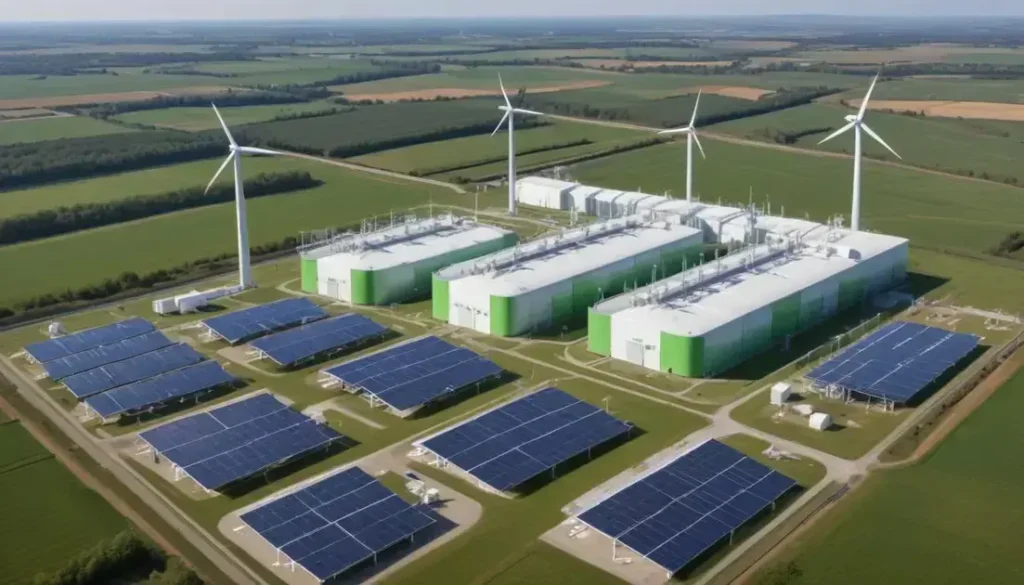The transition to electric vehicle production is crucial for Indian businesses to remain competitive, enhance sustainability, and comply with government regulations, necessitating investment in technology, workforce training, and strategic collaborations.
In light of stringent EU regulations, the future of EU emissions in the automotive sector is profoundly at stake. How should Indian businesses prepare for these changes?
Overview of Stellantis’s operations in Europe
Stellantis operates as one of the largest automotive manufacturers in Europe, overseeing a diverse portfolio of brands including Peugeot, Citroën, Fiat, and Chrysler. This broad representation allows Stellantis to cater to various market segments and consumer needs across the continent. The company’s operations focus on innovation, sustainability, and responsiveness to changing market dynamics.
Operational Efficiency and Sustainability: Stellantis has committed to enhancing operational efficiency while prioritizing sustainability. The company aims to transition towards electric vehicles, reducing emissions in line with EU regulations. By investing in electric and hybrid technologies, Stellantis is positioning itself as a leader in the sustainable automotive market, ensuring compliance with increasingly stringent regulations.
The manufacturing facilities across Europe are pivotal to Stellantis’s strategy, with plants in countries like France, Italy, and Germany. These locations not only serve local markets but also enable exports, tapping into international demand. Moreover, Stellantis’s approach to production includes maximizing local sourcing and minimizing the carbon footprint of its operations, reflecting a commitment to environmentally responsible practices.
Implications of tightening EU emissions regulations
The tightening of EU emissions regulations is set to have significant implications for the automotive industry. These new standards require manufacturers to lower carbon emissions, a challenge many companies are now facing. For Indian businesses exporting to Europe, this translates to a need for compliance and adaptation to these rules.
Impact on Automotive Manufacturers: As Stellantis and other manufacturers respond to these changes, they must enhance their technological capabilities. This shift could lead to increased investments in electric vehicles and hybrid technologies. Additionally, companies may need to reassess their supply chains to comply with the stricter guidelines.
The EU’s commitment to sustainability not only aims to reduce environmental impact but also encourages innovation. Industries must now focus on developing cleaner technologies and more efficient production methods. For Indian firms, this is an opportunity to innovate and explore new markets by aligning their products with EU standards.
Moreover, failure to comply with these regulations can result in hefty fines and market exclusion. Therefore, understanding and integrating EU emissions regulations into operational strategies will be crucial for Indian exporters looking to maintain competitiveness in the European market.
Jean-Philippe Imparato’s warning on factory closures
Jean-Philippe Imparato, the CEO of Peugeot, has issued a stark warning regarding potential factory closures in response to the ever-tightening EU emissions regulations. He emphasized that the automotive industry is at a critical juncture, where failure to adapt could lead to significant production cutbacks.
Imparato highlighted the need for manufacturers to innovate rapidly. He indicated that companies must invest heavily in sustainable technologies to meet the upcoming standards set by the European Union. Without these investments, manufacturing plants could face reduced operations or even permanent closure.
The implications of such decisions extend beyond the immediate economic impact. Factory closures could lead to job losses and a ripple effect on local economies, especially in communities dependent on automotive manufacturing. Indian firms that export to Europe must stay informed of these developments and consider how they might be affected.
Moreover, Imparato’s warning serves as a call to action for other players in the industry. It stresses the importance of collaboration among manufacturers, governments, and stakeholders to create a viable path forward that ensures compliance with regulations while maintaining economic viability within the automotive sector.
Impact on UK automotive sector
The UK automotive sector is facing significant challenges due to tightening EU emissions regulations. As these standards become more stringent, manufacturers must adapt quickly or risk falling behind. The impact on production could be profound, affecting everything from supply chains to consumer demand.
British automakers will need to invest heavily in sustainable technologies to comply with new emission targets. This transition to greener vehicles may lead to a decline in traditional petrol and diesel production, which currently drives a substantial portion of the sector’s economy. Furthermore, companies could see increased operational costs as they strive to innovate and meet these changing standards.
Another critical aspect is the potential job losses in manufacturing plants, particularly those focusing on older vehicle models. With reduced output of traditional vehicles, workers may face redundancy unless the industry pivots effectively towards electric and hybrid cars.
Additionally, the UK government plays a crucial role in supporting the automotive sector through initiatives and incentives for green technologies. Collaborative efforts between government bodies and automakers can create a robust framework for navigating these challenges while paving the way for a sustainable future in the automotive industry.
Current electric vehicle sales statistics
The landscape for electric vehicle (EV) sales has changed dramatically in recent years. In 2022, electric vehicles accounted for approximately 10% of total vehicle sales in Europe, showcasing a significant shift towards greener alternatives. This trend has accelerated further in 2023, with projections indicating that EV sales may rise to nearly 20% of the market share by the end of the year.
Several factors contribute to this surge in electric vehicle adoption, including advancements in battery technology, increasing consumer awareness of environmental issues, and government incentives encouraging the purchase of EVs. Additionally, many automotive manufacturers are expanding their electric offerings, leading to more options for consumers.
Sales data also show a marked increase in the popularity of electric SUVs and trucks. In fact, these segments are among the fastest-growing within the EV market, indicating consumer preferences are shifting towards larger, family-oriented electric vehicles. This move reflects a broader acceptance of EVs as viable alternatives to traditional gasoline-powered cars.
Despite the positive sales figures, challenges remain, such as charging infrastructure and production costs. Addressing these issues will be critical for sustaining momentum in the EV market and meeting increasing consumer demand for sustainable transportation solutions.
Government pressure on emissions targets
The automotive industry is currently under significant government pressure to meet stringent emissions targets. Numerous countries, particularly in Europe, are implementing aggressive policies aimed at reducing greenhouse gas emissions. These regulations challenge manufacturers to innovate rapidly and adopt cleaner technologies.
Governments are setting ambitious emission reduction goals, often targeting zero emissions by 2035 or 2040. This includes not only passenger vehicles but also commercial fleets, which together contribute substantially to overall emissions. As a result, automotive companies must accelerate their transition to electric and hybrid vehicles to align with these targets.
Additionally, governments are introducing financial incentives to support the shift towards sustainable transportation. Subsidies for consumers purchasing electric vehicles, coupled with penalties for non-compliance, are intended to create a balanced approach. Such strategies aim to encourage manufacturers and consumers alike to prioritize greener options.
This regulatory landscape has significant implications for Indian exporters looking to penetrate the European market. Understanding these pressures and adapting business models accordingly will be crucial for success. Companies must invest in research and development to enhance their product offerings and navigate the complex regulatory environment effectively.
Stellantis’s production strategy
Stellantis’s production strategy is designed to adapt to the rapidly changing automotive landscape while aligning with sustainability goals. The company aims to enhance efficiency and reduce its carbon footprint significantly. This strategy focuses on transitioning to electric vehicle (EV) production, which will be crucial as global demand for greener transportation increases.
To achieve these objectives, Stellantis is investing heavily in advanced manufacturing technologies. This includes automation and digitalization of production processes, which not only improves output but also minimizes waste. By harnessing data analytics and Internet of Things (IoT) capabilities, the company can monitor and optimize its operations in real time.
Moreover, Stellantis is diversifying its production facilities to meet local market demands. Establishing plants in strategic locations allows for efficient supply chains and reduced logistics costs. The commitment to local sourcing mirrors the company’s effort to enhance its global footprint while fostering sustainable practices.
The production strategy also encompasses collaboration with suppliers who prioritize environmental responsibility. By forming partnerships aligned with sustainability, Stellantis reinforces its commitment to lower emissions throughout the supply chain. As the automotive sector shifts towards electrification, Stellantis remains poised to lead the way with innovative and responsible production practices.
Expected changes in consumer behavior
As the automotive industry evolves, consumer behavior is expected to shift significantly, especially in the wake of increasing awareness about climate change and sustainability. More consumers are opting for electric vehicles (EVs) as they become more available and affordable. This trend is driven not only by environmental concerns but also by government incentives promoting green transportation.
Additionally, convenience plays a crucial role in shaping consumer choices. The rise of charging infrastructure is making EV ownership more feasible. Consumers now prioritize the accessibility of charging stations as a decisive factor in their purchasing decisions. This shift emphasizes the importance of a reliable charging network in promoting EV adoption.
Furthermore, younger generations, particularly millennials and Gen Z, are more inclined to embrace new technologies and sustainability practices. Their purchasing habits often reflect a preference for brands that demonstrate a commitment to environmental responsibility. This demographic also values features such as digital connectivity and advanced safety systems, pushing manufacturers to innovate further.
In summary, as awareness of environmental issues continues to grow, consumer preferences favor greener and smarter alternatives. Automotive companies must adapt to these changing behaviors by offering products that align with these evolving values, ensuring they meet market demands for sustainable transportation solutions.
Investment considerations for Indian firms
For Indian firms looking to invest in the automotive sector, several key considerations must guide their strategies. With the global shift towards electric vehicles (EVs), understanding the landscape of clean technology is crucial. These companies should evaluate the potential for partnerships with manufacturers and tech firms that specialize in EV development.
Moreover, government policies are increasingly favouring sustainable practices. Indian businesses should stay informed about incentives, subsidies, and tax breaks aimed at promoting green technologies. Aligning with these initiatives not only reduces costs but also enhances brand reputation among eco-conscious consumers.
Investment in research and development (R&D) is another critical factor. Firms must focus on innovating and improving efficiency within their operations. This could involve enhancing battery technology, improving charging infrastructure, and optimizing supply chain processes to reduce emissions.
Furthermore, it is essential to conduct thorough market research to understand consumer preferences. Shifts toward sustainability mean that customers are increasingly prioritizing EVs over traditional vehicles. Indian firms that can anticipate these changes and adapt accordingly will be better positioned to capture market share in a competitive environment.
Future of electric vehicle production
The future of electric vehicle (EV) production looks promising as advancements in technology continue to reshape the automotive landscape. Manufacturers are increasingly prioritizing sustainability to meet growing consumer demand for eco-friendly transportation. This shift is leading to significant investments in innovative production techniques and materials.
One notable trend is the adoption of battery technology improvements, which aim to enhance energy density and reduce charging times. Companies are exploring new battery chemistries and recycling methods to lower costs while maximizing performance. These advancements are expected to play a crucial role in making electric vehicles more accessible to the general public.
Additionally, automation and digitization of manufacturing processes are set to revolutionize production lines. Using artificial intelligence and robotics, manufacturers can streamline operations, reduce waste, and improve quality control. This technological integration not only boosts efficiency but also enables a more flexible manufacturing approach, allowing for faster adaptations to market demands.
As regulations continue to tighten globally, the emphasis on reducing emissions will further drive the transition toward EV production. Companies that embrace these changes and invest wisely will likely emerge as leaders in the evolving automotive market.
Potential job losses and economic implications
The shift towards electric vehicles (EVs) and stringent emissions regulations can lead to potential job losses in the automotive sector. As manufacturers pivot to cleaner technologies, traditional roles may become obsolete. This transition could disproportionately affect workers in manufacturing plants focused on conventional petrol and diesel vehicles.
Economic implications of these changes are profound. Regions that rely heavily on automotive manufacturing for their economic stability may face significant challenges. Job losses not only affect individual livelihoods but also have ripple effects on local economies, decreasing consumer spending and tax revenues.
Transitioning to EV production requires a different skill set, and many workers may need retraining to align with new market demands. This necessity for reskilling presents a challenge for businesses and governments alike, as significant investments in training programs will be required. Companies must prioritize workforce development to ensure a smooth transition.
Moreover, the increasing reliance on automation and advanced manufacturing technologies could further complicate the job landscape. While these innovations enhance productivity, they may lead to fewer jobs available for unskilled or semi-skilled workers. Therefore, addressing potential job losses through proactive measures is essential to maintain economic stability and workforce motivation during this evolution in the automotive industry.
Call to action for Indian businesses
As the automotive industry undergoes a significant transformation, Indian businesses must adapt proactively to remain competitive. A strong call to action emphasizes the need for these companies to invest in sustainable practices, particularly as global demand for electric vehicles (EVs) continues to rise. Embracing innovation is not just a choice; it is essential for survival in a rapidly evolving market.
Indian firms should prioritize developing strategic partnerships with technology providers and stakeholders. Collaborating with industry leaders can accelerate the adoption of cutting-edge solutions and enhance their competitive edge. These partnerships also foster knowledge sharing, which is crucial for navigating the complexities of the transition to electric mobility.
Additionally, companies must engage in training and upskilling programs for their workforce. Investing in human capital is vital as the industry shifts towards more advanced technologies. By equipping employees with the necessary skills, businesses can ensure a smooth transition and enhance productivity.
Moreover, Indian businesses must actively participate in discussions about regulatory frameworks and standards for the automotive sector. Being involved in policy-making will allow them to contribute insights and advocate for favorable conditions that support growth and sustainability.
In Summary: Embracing the Future of the Automotive Industry
The automotive sector is on the brink of a significant transformation, driven by electric vehicles and sustainability initiatives. Indian businesses must adapt quickly to these changes to remain competitive in the global market.
By investing in innovative technologies and forming strategic partnerships, companies can lead the charge toward a greener future. It is critical for businesses to reskill their workforce and engage in policy discussions to shape the industry positively.
Success in this transition requires a proactive approach, focusing on sustainability while also addressing potential economic implications for workers. With a strong commitment to change, Indian firms can not only thrive in the electric vehicle landscape but also contribute to a more sustainable world.
Embrace the opportunities that lie ahead, and be part of this exciting journey towards a cleaner and more efficient automotive industry.
Frequently Asked Questions
What are the key benefits of investing in electric vehicles for Indian businesses?
Investing in electric vehicles offers Indian businesses the chance to tap into a growing market, comply with government regulations, and enhance their sustainability profile, leading to better brand reputation.
How can Indian firms prepare for the transition to electric vehicle production?
Firms can prepare by investing in new technologies, training their workforce, and establishing partnerships with technology providers to enhance their capabilities in EV production.
What role does government policy play in the automotive industry’s shift to sustainability?
Government policy is crucial as it sets regulations and provides incentives that encourage companies to adopt greener practices and invest in electric vehicle technology.
What challenges might workers face during the transition to electric vehicles?
Workers may face job losses in traditional roles, requiring reskilling and training to adapt to new positions focused on electric vehicle production and sustainable practices.
Why is collaboration important for Indian automotive companies?
Collaboration allows companies to share resources and knowledge, which can drive innovation and improve efficiency in the transition to electric vehicle manufacturing.
How can businesses engage in policy discussions regarding electric vehicles?
Businesses can engage by participating in industry associations, attending forums, and lobbying for favorable regulations that support the growth of electric vehicle markets.


